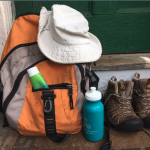Farming and Diabetes
By Brie Weisman OTR/L
The rate of new adult cases in the Diabetes epidemic has been slowing down over the past 10 years; however, indigenous peoples continue to have the highest percentage of cases according to the CDC. Maine’s most northern and eastern counties also tend to have the highest rates of diabetes in the state, due in part to higher ratios of indigenous populations. Type 2 diabetes accounts for approximately 90% of all diabetes cases. Type 2 is largely due to excess body weight and physical inactivity. Left unchecked, diabetes can lead to serious health issues.
 Agricultural workers with diabetes have additional challenges to address to remain safe, such as wound care, managing medication, diet, foot care, and neuropathy. Following basic self-care practices dramatically reduces the chance of these challenges leading to more serious problems.
Agricultural workers with diabetes have additional challenges to address to remain safe, such as wound care, managing medication, diet, foot care, and neuropathy. Following basic self-care practices dramatically reduces the chance of these challenges leading to more serious problems.
- Working outdoors and manual labor are activities with a high risk of cuts, nicks, and scrapes. Perform daily skin checks to address any small wounds before they worsen. Keep wounds clean and dry. Cleaning and dressing any wounds should always be a priority.
- Checking blood glucose levels is a necessity, but it can become difficult with a varying schedule and frequent changes of tasks and work locations. Talk to your primary care provider about a continuous blood glucose monitor, which automatically monitors glucose levels and can even work with automatic delivery systems.
- Eating healthy foods in a timely manner is an essential tool in managing diabetes, but it can be difficult when you are working to complete a task before a weather event or to beat a deadline. Talk to a diabetic nurse educator about good food choices for diabetics eating on the go.
- Blistered and damaged feet are a serious threat to people with diabetes. Make sure your footwear fits well and will keep you as dry as possible. Check feet daily for wounds.
- Neuropathy in the hands can lead to dropping items, or difficulty picking up gear and handling tools. Loss of feeling in the legs and feet means an increased risk of tripping or getting entangled in gear. Use ergonomically correct tools and try tools with modified handles that are easier to grip.
Diabetes is a serious disease, but proper management and respect for it will enable people with diabetes to continue to work in challenging environments such as fishing, farming, and logging.
The Ohio State University Extension has the Farming with Diabetes publication, which has additional information to support people working in agriculture who have diabetes.
